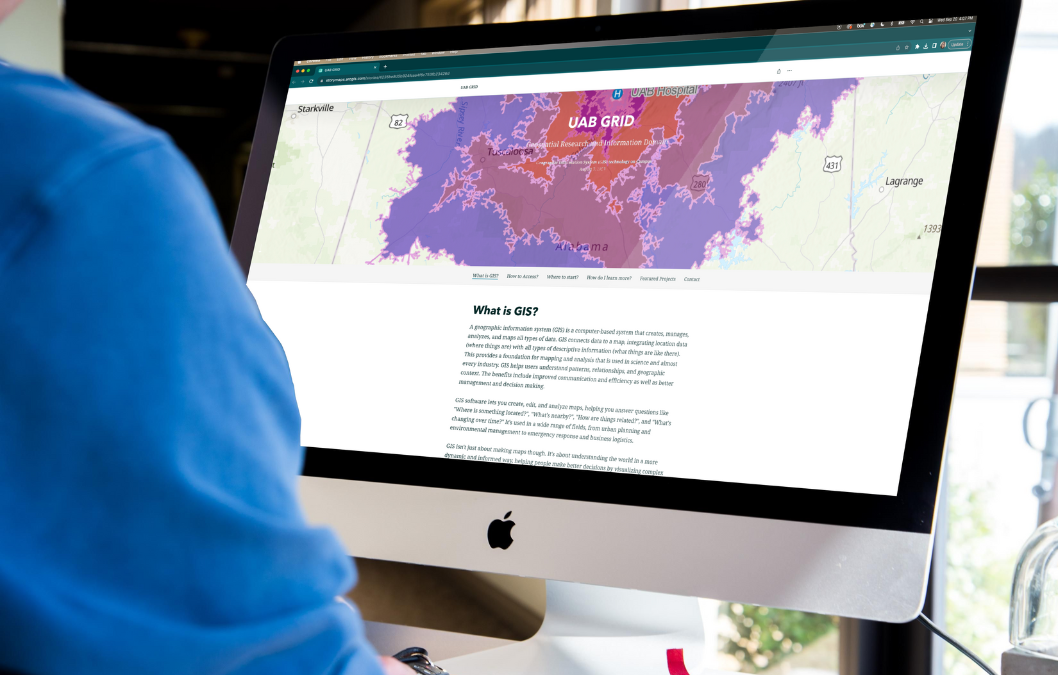The Social Determinants of Health (SDH) Core enables UAB investigators to measure the effect of social and environmental risks for disease etiology, progression, management, and outcomes, and test interventions that ameliorate their effect. Our services facilitate innovative investigations of genome-sociome-exposome pathways to health and disease through integrated data, methodologies, and expertise from social science, spatial and environmental science, clinical and translational science, genomics, informatics, and epidemiology.
Our Core works to advance research on the impact of Social Determinants of Health, working with teams as they consider the circumstances in which people are born, live, work, and age. To learn more, click one of the topics below or contact us.
| Service Request | GIS Computer Time | Drop-in Clinic | Project Examples | Resources | Training | Team | History |
Services
We provide the following services and resources to investigators conducting health disparities and SDH research:
-
Consultations on individual- and area-level SDH measures, data, and tools to answer specific research questions
- We offer methodological expertise on selecting, obtaining, linking, and analyzing appropriate area- and individual-level SDH measures and data
- Drop-in Clinics are held each Friday, 9:30–11 am at BDB 826. Other times are available by appointment.
-
Geocoding of addresses and geo-linking them to Census geography
- We geocode location data using ArcGIS Pro 3.1 and StreetMap Premium on a local desktop behind UAB’s firewall to ensure HIPAA compliance.
-
Integration of area-level SDH measures with data from electronic health records, patient registries, research cohorts, administrative claims, and other clinical or research data
- We merge geocoded data, via associated geo-identifiers, with SDH measures while ensuring temporal alignment and matching to appropriate data-specific geography (Census block group, tract, zip code, or county).
-
Geospatial Analysis and Mapping
- We offer geospatial mapping for presentation and publication purposes. Requests for driving time and distance analysis, hot spot analysis, and interactive web mapping applications can be accommodated as well.
- To learn more, visit the UAB Geospatial Research and Information Domain (GRID) website.

-
Data analysis
- We offer consultation on data analysis and/or data analysis support. We provide statistical support for a variety of models, including linear mixed models, non-linear mixed models, and hazard models, specializing in nested data both geographically and longitudinally. We also provide statistical consultation to ensure that selected models are appropriate for your hypotheses.
-
Capture, exchange, transformation, and integration of EHR data with SDH measures on demand
- We provide these services in collaboration with UAB Informatics Institute staff.
-
Integration of SDH concepts into EHR for clinical decision-making and health services research
- This service is provided in collaboration with experts from several UAB units as appropriate.
-
Support with development of abstracts, presentations, and manuscripts that include SDH
- PIs will agree to acknowledge the contribution of the SDH Core in any and all oral and written presentations, disclosures, and publications resulting from any and all analyses of data or materials. Authorship criteria are based on the International Committee of Medical Journal Editors (ICMJE) Guidelines.
-
Support with development of grant proposals that include SDH
When proposing collaboration with the SDH Core in grant applications, a fee for SDH Core services or effort for SDH Core personnel must be included in the application budget.
-
Determining Study Eligibility
An interactive mapping tool to determine study eligibility based on residential address.
Service Request Form
To schedule a consultation or request other services, please complete and submit the form below.
*Effort for SDH staff is an acceptable alternative to hourly rate. Vouchers for services may be available through partnering Centers.
GIS Computer Time Request
Geocoding any patient data using the World Geocoding Service which is the default geocoder in ArcGIS Pro as well as AGOL is not approved by the UAB IRB. Patient data can be geocoded using a dataset of nationwide street networks called StreetMap Premium. This ensures that patient data is not sent to the cloud and remains behind the UAB firewall. StreetMap Premium is installed for use with ArcGIS Pro on a desktop in the Boshelle Diabetes building, (BDB 863) on the 8th floor and is available for anyone with a reservation on Wednesdays and Thursdays.
For more information or to request an appointment for geocoding computer access, please fill out the form below.
Drop-in Clinic
The SDH Core virtual drop-in clinic is held each Friday from 9:30 am – 11:00 am.
Please note: The session for 3/21/2025 has been canceled.
Connect via ZoomOpens an external link.
Project Examples
- Elizabeth Baker, Ph.D.: Food insecurity screening, local food access, and state food assistance policies: contributions to nutritional outcomes across CF programs
- Smita Bhatia, M.D.: Predicting key adverse outcomes in blood or marrow transplant survivors
- Stephen Clarkson, M.D.: Social vulnerability and hospitalizations for heart failure
- Joseph Crivelli, M.D.: Associations of obesity and neighborhood factors with urinary stone parameters
- Miranda Curtiss, M.D.: Natural history of ABPA treated with biologics for uncontrolled severe persistent asthma
- Brad Fancher, M.D.: Residential green space and hospital admissions in allergic vs non-allergic asthma patients
- Andrea Gillis, M.D.: Identifying epigenetic mediators of racial disparities in pancreatic ductal adenocarcinoma
- Mohini Gunnett, M.D.: Positive Airway Pressure (PAP) clinic visits after the Philips Respironics device recall
- Carrie Howell, Ph.D.: Evaluating preexisting metabolic risk factors and persistent inflammation resulting in PASC
- Peter Morris, M.D.: Addressing inpatient trial design translational barriers through refining post-ICU recovery trajectories to inform hospital readmissions
- Javier Neyra, M.D.: Neighborhood social determinants of health and acute kidney injury during hospitalization
- Gabriela Oates, Ph.D.: The contribution of social and environmental factors for lung function decline COPD: longitudinal analysis of EHR data
Resources
-
SDH Toolkit
We maintain SDH Toolkit with scales, indices, and instruments to measure various individual- and area-level social determinants of health.
To access the toolkit:
- UAB Employees: UAB Employees can instantly access the toolkit using the link above and their Blazer ID/password.
- External Users, non-UAB Employees: Those without a “@uab.edu” email address, can still get access to the toolkit. Please contact Joy Ledvina at jrledvina@uabmc.edu.
-
Geographic Information System (GIS)
ArcPro and ArcGIS Online, as well as other Esri desktop, mobile, and cloud-based geospatial technology, are freely available for geocoding, geo-mapping, data visualization, and analysis. To learn more, visit the UAB Geospatial Research and Information Domain (GRID) website.

-
Online learning modules on the use of Esri ArcGIS products
Curated Learning Plans are available by signing in to Esri training using one’s UAB GIS username and password (Note: This is not your Blazer ID). Learning Plans offer a sequenced way of learning specific content and skills via readings, videos, and hands-on resources, and allow individuals to choose learning paths tailored to their need.
Training
We provide training and education to UAB faculty, students, and staff on the use of SDH measures, tools, and data to answer specific research questions. Lectures, seminars, workshops, and short courses can be scheduled on demand or offered as part of existing training programs:
- CCTS Training Academy
- Health Disparities Research Education Program (HDREP)
- MHERC/COERE/CCTS/RCMAR Research Methods and Secondary Data Analysis Seminar Series
- Informatics Powertalk Seminar Series
Our Team

Gabriela Oates, Ph.D. – Director
Dr. Oates, Associate Professor in the UAB Heersink School of Medicine, Division of Pulmonary, Allergy and Critical Care Medicine, is a social epidemiologist with expertise in sociological theory and research methods focused on the social determinants of health (SDH), and experience in the application of SDH measures, tools, and data for health disparities, outcomes, and health services research.

Elizabeth Baker, Ph.D. – Co-Director
Dr. Baker, Associate Professor in the UAB College of Arts and Sciences, Department of Sociology, is a quantitative methodologist with a background in demography and expertise in U.S. Census data. She co-leads the SDH Core and manages the SDH Toolkit.

Lucia Juarez, Ph.D., Director of Data Analytics and Statistical Support
Dr. Juarez, is an Assistant Professor in the Heersink School of Medicine and Director of Statistical Computing in the Division of Preventive Medicine. With more than 20 years’ experience managing large multisite cohort studies, she supports the linkage of multilevel SDH and clinical data and supervises a Core statistician in data management, quality control, data analyses, and other tasks.

Ariann Nassel, M.A., Director of Geospatial Services
Ms. Nassel is the Director of Geospatial Data Visualization at the UAB Lister Hill Center for Health Policy. She is an expert in Census geography, developing Geographic Information Systems (GIS) applications for research projects, and performing geospatial analysis. She provides HIPAA-compliant geocoding and cartographic mapping. She manages UAB’s Esri ArcGIS site license and leads trainings related to the use of GIS.
Collaborators
Carrie R. Howell, PhD, Health System Scientist
Dr. Howell, Assistant Professor in the UAB Division of Preventive Medicine, has experience in integrating clinical, SDH, and behavior data to inform disease prevention and management. She provides expertise in the development of risk prediction models and use of SDH data to inform clinical care and intervention targets.
Robert Johnson, MS, System Analyst
Mr. Johnson, a Senior System analyst in the UAB Informatics Institute, manages the Enterprise Data Warehouse. He assists with queries of inpatient and outpatient data, exporting data in multiple formats, and transforming data for further analysis.
History of the Core
The SDH Core was established by the Minority Health & Health Equity Research Center (MHERC), a University-Wide Interdisciplinary Research Center (UWIRC), in 2014. With additional support from the NIMHD-funded U54 Mid-South Transdisciplinary Collaborative Center for Health Disparities Research, the SDH Core provided: (1) a toolkit with SDH measures, scales, and instruments; (2) SDH data from existing public sources such as the U.S. Census; (3) SDH data specific to the Mid-South region; and (4) methodological expertise on SDH through consultations and seminars.
In 2018, Core services were expanded through support from the NIMHD-funded U54 Obesity Health Disparities Research Center regional expansion. Specifically, the SDH Toolkit was migrated to Canvas to enhance access, facilitate training, and improve usage tracking. We also expanded the range of SDH concepts and measures in the Toolkit and created comparison tables with the PhenX Toolkit SDH data collections. Additionally, through the OHDRC Common Data Elements Project, we geocoded patient addresses in the UAB EHR and linked them to neighborhood-level SDH measures, with data housed in the Enterprise Data Warehouse and available for queries via i2b2.
In 2020, the SDH Core convened the UAB Social Informatics Workgroup with the goal of (a) enhancing patient-level SDH measures available in the EHR; (b) expanding the suite of area-level SDH measures linked to EHR data and improving the geocoding and geo-linking process; (c) informing the UAB clinical and research communities about the integrated measures; and (d) promoting innovative multidisciplinary research with SDH. Area-level measures were expanded to include variables such as residential segregation, walkability, and social vulnerability, whereas optimized geocoding and linkage reduced missing data from ~25% to <10%. We also categorized clinical events into SDH domains using nomenclature from the Social Interventions Research and Evaluation Network (SIREN) and organized SDH concepts into searchable folders to facilitate use.
In 2021, we developed a tiered system of Core services and established administrative processes such as online service intake form, Data Use and Services Agreement, and tracking system for service requests, users, and outputs.
In 2023, with a seed funding from the CCTS, we secured the first campus-wide Esri Geographic Information Systems (GIS) site license, a vital resource for the UAB research community. The license allows all UAB faculty, students, and staff to access the full suite of desktop, mobile, and cloud-based Esri ArcGIS products for geocoding, mapping, data visualization, and spatial analysis.
In August 2023, the SDH Core was designated as UAB Institutional Research Core in order to meet critical institutional needs efficiently and effectively through pooled resources, operational efficiencies, scaled service delivery, enhanced training opportunities, and expanded reach to investigators at all career stages.
News
Newsletter Archive
Contact
For any other questions, please contact us at SDHCore@uabmc.edu.